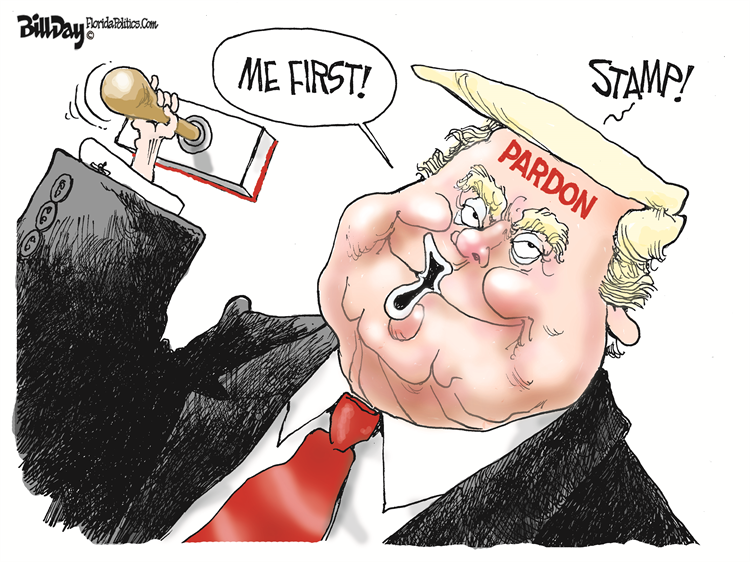
The issue of whether a sitting president can pardon himself was debated ad nauseam by constitutional and legal scholars, by journalists and pundits, during the last few weeks of Trump’s “reign.”
In “Why a Self-Pardon Is Not Constitutional,” Professor Frank O. Bowman authoritatively argued a president cannot constitutionally pardon himself.
In “Can a Turkey Pardon Himself?” this author non-authoritatively argued “a turkey — even a supreme turkey leader — cannot (constitutionally) pardon himself.”
Had Trump openly and publicly pardoned himself, the case would certainly have made it all the way to the Supreme Court.
As Trump’s legal problems mount, the man does not seem to be very worried about them – at least not about possible federal crimes – even though federal prosecutors are considering what, if any, criminal liability may be for Trump for what happened on January 6.
Does he know something we don’t?
Did he perhaps grant himself and possibly his children and others secret pardons during his final hours in office?
His former lawyer, Michael Cohen, believes he has done so and that “he will reveal [those pardons] if he is indicted.”
Even before Cohen’s conjecture, there was speculation about such a “pocket pardon.”
Just a few days before Trump’s ungraceful exit, MSNBC’s Lawrence O’Donnell warned “We should not trust the Trump pardon list when it is publicly revealed. He added, there is “no reason to believe” Trump will “make every pardon he grants in the final hours of his presidency public.”
Around the same time as Trump was slinking out of the White House, Jeffrey Crouch, an assistant professor of American politics at American University and author of The Presidential Pardon Power, asked, “Did the norm-breaking president break one more on his way out the door, issuing pardons in secret to his friends, family or even himself, break-in-case-of-emergency documents to be produced if necessary?”
But why did Trump not publicly pardon himself before leaving office?
One must keep in mind that the weeks just before and just after Trump’s departure were taken up by Trump’s second impeachment and impeachment trial charging Trump with “incitement of insurrection” after a violent mob stormed and broke into the Capitol on January 6.
Once more, Professor Crouch:
[Trump] probably saw [secret pardons] as a way to satisfy two competing goals: avoiding offending Republican senators who could still vote to convict him in his impeachment trial and having a hidden defense ready if the Biden Justice Department proceeds against Trump or those close to him. Keeping the pardons quiet unless they are needed would also prevent Trump from appearing to dare the Justice Department to challenge a self-pardon, if he went that unprecedented route.
The issue of a secret presidential pardon, especially a secret self-pardon, is even more controversial than a “regular” presidential self-pardon.
A couple of cons:
• It would be difficult to authenticate. “There would be no way to prove it was issued on a certain date in an official capacity.”
• “The notion of a secret pardon is an oxymoron. The very concept of a pardon is that it is a public act, granting mercy to the recipient…a pardon kept from public view would frustrate an essential element of the otherwise absolute pardon power: public accountability through political consequences…it could cause chaos in the courts…The result would be to undermine the predictability of the judicial process…A president could be out of office for weeks, months or years and still influence court proceedings.” — Jeffrey Crouch
A 14 January 2021 piece at “The Hill” indicates: “There is nothing in Article II, Section II, preventing President Trump from signing a document granting a pardon, and then putting the paper in a safe at any of his golf resorts. He is not even required to notify the recipient.” The writers then quickly urge Congress “to immediately enact a law limiting the power of the president to issue secret pardons.”
In the case of Trump, that horse has already left the barn.
Margaret Love, who served as U.S. pardon attorney from 1990 to 1997 and who believes in broad presidential pardon powers wrote in a June 2018 Washington Post opinion piece, “There is nothing surprising or necessarily alarming about Trump’s embrace of this broad executive power…” but, she added, “while Trump’s pardons are hardly unique, the process that produced them is troublesome.”
Although Love was not addressing a presidential self-pardon, it is noteworthy that a year earlier she remarked, “The president can do this pretty much in any form he wants, as long as it’s a public announcement…Stick your head out the window, yell it out in the street.”
“We have never had secret pardons and the whole idea of a pardon is that it is a public document,” Love said another time.
.
If a secret Trump “self-pardon” rears its ugly head, our nation will once again be plunged into uncharted troubled waters thanks to the cunning, unscrupulous, guilty mind of a man who will resort to any and all Machiavellian tactics in order to save his own skin.
















